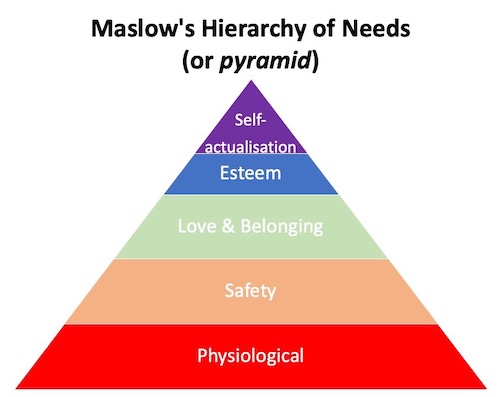
Climbing Maslow's pyramid of needs
- Matthieu P.J.
- Personal development
- August 7, 2021
Abraham Maslow (1908–1970) was a prominent American psychologist whose name is famous today for one of his legacy work: the hierarchy of needs.
This tool is relatively simple and illustrates the idea that there is a hierarchy of needs in human life and that, somehow, we can only truly attend to each level once we have mastered the levels below.

Although this is a tool introduced in the domain of psychology, it translates very well if we put a spiritual lens on.
In this pyramidal model, the idea is that man progresses throughout his life from the lower levels to the highest. It starts at the level of bodily survival and culminates at the level of self-actualisation. That final stage can be loosely likened to spiritual enlightenment in the sense that is is the moment when one has truly reached its full potential.
Here are more details about each layer (from bottom to top):
- Physiological needs: they are related to the body needs. This includes: food, water, breathing, sleep, clothing, shelter, sex.
- Safety needs: money, job, stability, public order, health & wellbeing.
- Love & Belonging: family, friendship, affection, intimate relationship, feeling that we are part of a collective.
- Esteem: dignity, confidence, sense of accomplishment, desire for status in society and public recognition.
- Self-actualisation: personal growth and fulfilment, reaching one’s full potential in life, using personal gifts and abilities. It’s easy to correlate that with the spiritual journey; at this stage, life is about living one’s dharma (life purpose), and transcending the material world.
A parallel can also be made with the chronological stages of life:
- In the morning of our life, we focus on having our basic needs secured, which the parents normally provide for. These are around physical survival and feeling safe.
- In the afternoon of our life, once we have stabilised ourself and the survival has been transcended, we put more attention towards our relationships, the importance of love and esteem.
- In the evening of our life—for those who ever get there—all other preoccupations sit in the background as we reach self-actualisation: the stage where one is at peace with the world and feels true fulfilment.
Maslow’s pyramid is not a perfect model, but it touches on some universal truth that we can all feel: we need to sort out some fundamental aspects of our life before we even get the possibility to become aware that there is more to life. Each of the 5 stages in Maslow’s hierarchy of needs has its own lessons that must be mastered before progressing further ahead.
So take a moment to reflect upon this: where do you think you are, at this moment in your life, on your way up the pyramid?


